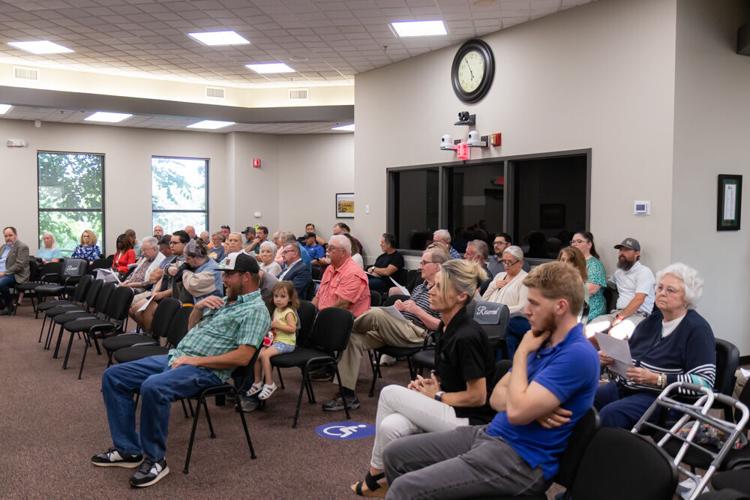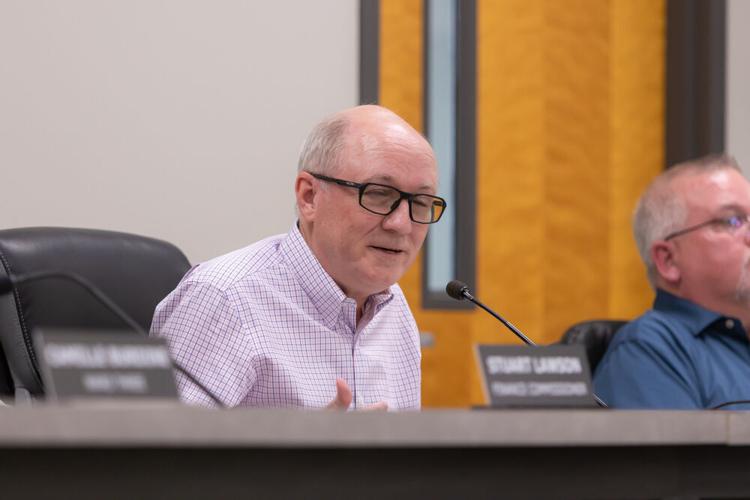The sanitation fee resolution, which caused many conversations and criticisms within Lebanon, was passed by the City Council in a 4-2 vote during Tuesday’s meeting.
The structure of the fee will be $20 for residential customers and $40 for business customers. The city’s sanitation department does not pick up dumpsters used by businesses, only bins specifically used for the city service.
Geri Ashley and Camille Burdine, Councilors for Ward 2 and 3 respectively, stuck to their votes against the fee for the second reading. Both raised concerns of how residents at or below the poverty line or seniors on fixed incomes may be impacted by the $20 per month fee.
Questions regarding how the sanitation department is funded were asked as confusion rippled through the community.
“This was an unadvertised discussion in a work session. It was a 15-minute discussion,” Ashley said. “I still don’t have all my questions answered. I don’t feel like I have the economic information.”
“I think that we should, as a City Council, have spent more time talking about it and seeing if we could come up with any other solutions,” Ashley added. “If in fact we are paying for garbage in our city’s taxes, and now we’re incorporating a fee, then what happens next year when we get our taxes? Are our taxes going to be reduced at that point, because that is a double dip.”
On Wednesday, Burdine reiterated her thoughts that the city should be more proactive in studying the impact on the citizens before a fee was implemented. She said the response to rising costs caused the city to be “reactive instead of proactive.”
Burdine said she is not opposed to a sanitation fee, but feels that more time should have been spent researching it.
Also on Wednesday, Ashley called the fee a “knee-jerk reaction” and likewise felt that not enough research was done. She also said instead of a flat fee, a property tax increase would take into account the property values and Wards 1, 2 and 3 would not have to deal with a monthly fee which might be a burden.
Ashley said she wants to see if the sanitation fee will disappear from the property taxes.
Ward 1 Councilor Joey Carmack said he supported the fee because it’s a flat fee that all residents pay, which doesn’t fluctuate.
“I do not feel it’s fair for the sanitation fee to be a property tax,” Carmack said. “A property tax would be unfair, because for example, person one has a $1 million house, and [may] only have one can of trash. They would pay more taxes than person two [who has] a $350,000 home.”
“We dump the trash from the city at Walter Hill (in Murfreesboro), which has been in the news about closing soon,” Carmack added. “When that does happen, we will be paying even more to dump trash.”
Middle Point Landfill has been working with Rutherford County to increase fees for “out-of-county” tipping fees, as well as downsizing the number of counties allowed to dump there. During a meeting earlier this year, it was proposed to double the fees for non-Rutherford County clients from $1.20 per ton to $2.50 per ton to generate more revenue for that county.
The town meeting hall had more residents in attendance than usual, which was commented on by the Councilors, who expressed gratitude for the increased attendance. Burdine, Chris Crowell, Councilor for Ward 4 and Phil Morehead, Councilor for Ward 6, particularly welcomed the attendance and interest in city business.
During the public comment period, nearly a dozen people spoke to the City Council.
One resident, Stephen Lawson, said he and others should have the option to opt out of the fee, and that he would rather pay a private company $30 to support that business than give the city $20. He also asked if there were other landfills which could be used.
“I thought there was a landfill in Wilson County. Is that one full?” Lawson asked.
“That’s owned by the Wilson County government, and it’s just open to construction materials,” Mayor Bell responded. “It’s not open to us.”
Alex Buhler, former Ward 1 Councilor who stepped-down in 2012, also spoke.
“They should have that option to opt out,” Buhler said. “If a thousand people opt out, that’s a thousand houses you don’t have to go to.”
Bell responded by saying that wouldn’t save as much money as people think because the sanitation trucks will still be driving by those houses anyway. Some of the Councilors said they don’t know if private companies would have the same quality of work that the city does, as officials believe sanitation is a public health matter which the Council “takes seriously.”
Another resident wondered if the sanitation fee would lead to the start of “nickel and diming” the residents of the city.
Glenn Denton, County Commissioner for District 20, which covers the downtown Lebanon region of the county, criticized the growth of the city, which he thinks sparked the need for growing services and the fees to pay for them.
“Enough is enough. We have overbuilt in our city beyond what our infrastructure can handle,” Denton said. “When do we stop building to where we cannot service and when we cannot pay for the infrastructure around it?”
Nearly an hour and a half was spent discussing the sanitation fee and budget for the next year. With the passing of the resolution, the sanitation fee goes into effect July 1.
















(0) comments
Welcome to the discussion.
Log In
Keep it Clean. Please avoid obscene, vulgar, lewd, racist or sexually-oriented language.
PLEASE TURN OFF YOUR CAPS LOCK.
Don't Threaten. Threats of harming another person will not be tolerated.
Be Truthful. Don't knowingly lie about anyone or anything.
Be Nice. No racism, sexism or any sort of -ism that is degrading to another person.
Be Proactive. Use the 'Report' link on each comment to let us know of abusive posts.
Share with Us. We'd love to hear eyewitness accounts, the history behind an article.